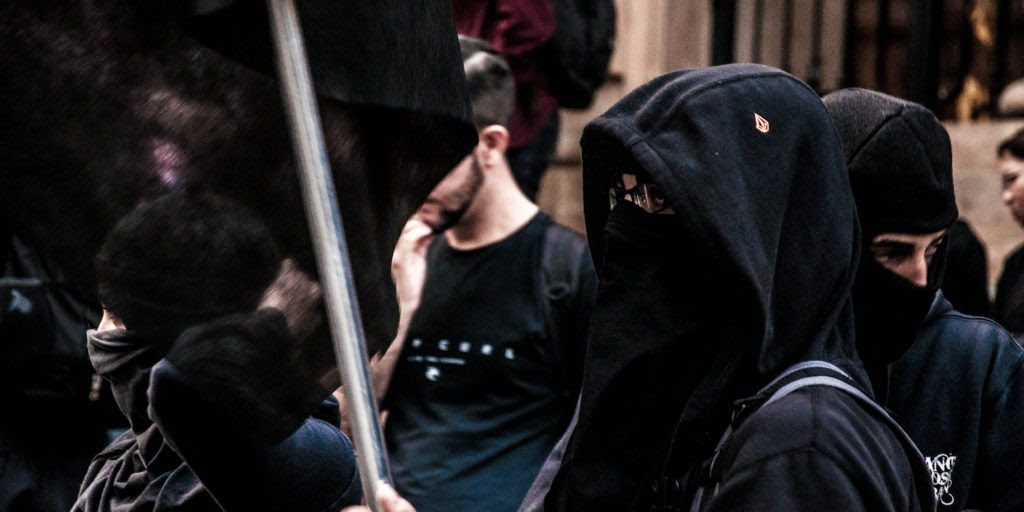
The election of President Donald Trump has seen a surge in activity from Antifa, a radical collection of protestors whose confrontational tactics have spurred controversy, violence, and confusion across the United States. The resurgence of extremist far-left groups committed to violently putting down a far-right that has been energized by President Trump’s inflammatory rhetoric, has polarized the electorate. Some believe that equally violent neo-Nazi gangs and the trolling alt-right have finally met their match. Others see the violence as a tragic abandonment of civility in an era already defined by hyper-partisanship.
Antifa is a loose and decentralized network of mainly leftist groups working to directly confront and resist ultra conservative groups, which they consider to be fascist and racist. There is no leader or hierarchical structure in establishing new groups, so a self-started and local anti-fascist organization will self-identify with other Antifa-affiliated groups through commitment in opposing, sexism, racism, and classism, which they consider to be the primary evils of contemporary society. The movement has gained notoriety for strongly advocating for the use of violent, direct confrontation and property destruction as a means of resistance. Some Antifa activists justify it as a reflection of the violence enacted on minority groups by far-right gangs. But violence perpetuates violence and often buries the overall message.
In early February, a student Republican organization at the University of California, Berkeley was set to host Milo Yiannopoulos, a conservative with strong right wing leanings. The event, however, was derailed when a large demonstration, attracting over 1,500 student protesters, erupted into violence after a small cell of anti-fascists showed up. The “group of about 150 masked agitators,” used “black block tactics” to set fires, smash windows, and throw fireworks at police officers, who struggled to contain the chaos. Antifa caused an estimated $100,000 in damage to public and private property. Since then, Antifa has appeared in “black bloc” at rallies across the country. While not all “black bloc” gangs are violent, being dressed in black and disguised with masks allows demonstrators to engage their opponents in violence without identifying themselves.
The Antifa movement dates back to the 1920s with its roots in Europe when fascism and nationalism arose. The German Communist Party gave it the name Antifaschistische Aktion, from which the abbreviated Antifa derives its name. Hitler quickly abolished the movement when he seized power in Germany. Antifa fought in the streets with fascist groups in Britain, Spain, Italy and other places where fascism popped up. The American version opposed racism, including the Ku Klux Klan and other emergent neo-fascist groups.
Now in the age of President Trump, Antifa has re-emerged because of his populist politics, a blend of nationalism and inflammatory rhetoric. Antifa chapters are surging, appearing in almost every major U.S. city. They use social media to organize and communicate foster exponential growth. They operate their own news sites, monitor key individuals on the far-right and report on Antifa activities.
In May, it was revealed that Trump supporters had been quietly assembling a document containing the names, addresses, social media profiles, and phone numbers of thousands of suspected Antifa members. Trolls, likewise, have created fake Twitter accounts to mock and discredit the Antifa movement beyond the negative press that comes with destructive and violent demonstrations.
The movement is still committed to street activism, burning cars, smashing Starbucks and other social icons, throwing bricks and other debris at police, etc. They use graffiti and posters to spread their message. Like their alt-right counterparts, Antifa is not a singular entity but a diverse network of factions ostensibly committed to similar ends. In the U.S. they oppose “increased deportations, the registration of Muslims, bans on abortion and birth control, attacks on LGBTQ people, anti-Semitic populism, etc.
Antifa is a symptom of and catalyst for the extreme political divide within President Trump’s America.
“The earth also was corrupt before God, and the earth was filled with violence.” Genesis 6:11.
Source References
Untangling Antifa, the controversial protest group at war with the alt-right
